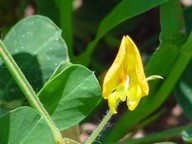Arachis advances, breaking new ground: groundnut genome successfully sequenced
- Monday, 14 April 2014 16:41
 Early this month, an international team made a giant breakthrough in groundnut research, successfully sequencing the groundnut (Arachis hypogaea) genome. This fruitful outcome was the sum of several years of effort, multiplied by teamwork bringing together scientists from Asia, Latin America and USA.
Early this month, an international team made a giant breakthrough in groundnut research, successfully sequencing the groundnut (Arachis hypogaea) genome. This fruitful outcome was the sum of several years of effort, multiplied by teamwork bringing together scientists from Asia, Latin America and USA.
Some of the players in this illustrious team are old friends, well known within GCP circles, and include:
- David Bertioli and Soraya Leal-Bertioli from Brazil (Universidade de Brasilia and EMBRAPA, respectively), who have been lead researchers in our groundnut work since GCP’s early days (see link to videos below).
- Peggy Ozias-Akins, who was the Principal Investigator of our groundnut project with the University of Georgia (USA), implemented through our Legumes Research Initiative (RI).
- Rajeev Varshney, immediate former leader of our genomics work.
- Dave Hoisington, who was the pioneer PI of our groundnut work n the Tropical Legumes I (TLI) project, before handing over the reins to Vincent Vadez. Dave continues to be actively involved in GCP and the bond has remained unbroken across his career crossings. He’s currently the Independent Chair of our Consortium Committee.
- Scott Jackson, who previously served as advisor on our genomics work, and has since severally reviewed TLI, implemented through our Legumes RI.
Groundnuts are also known as peanuts. According to Rajeev Varshney, improving groundnut varieties to be more drought-, insect- and disease-resistant can help farmers in developed nations produce more groundnuts with fewer pesticides and other chemicals, thus improving food security and livelihoods.
Whereas groundnuts were successfully bred for intensive cultivation for millennia, compared to other crops, relatively little was known about their genetic structure because of its complexity, according to Peggy Ozias-Akins.
David Bertioli adds: "Until now, we've bred peanuts relatively blindly, as compared to other crops. We've had less information to work with than we do with many crops, which have been more thoroughly researched and understood."
Dave Hoisington concludes: "With the release of the peanut genome sequence, researchers will now have much better tools available to accelerate the development of new peanut varieties with improved yields and better nutrition."
This story is partially adapted from the full Science Newsline story here.
Links
- FLASHBACK: Two years ago, a crucial checkpoint on the road to the current achievement
- FASTFORWARD: Current facts and figures on groundnut research in Africa, with Vincent Vadez
- VIDEOS: Soraya Leal-Bertioli, David Bertioli, Vincent Vadez, and others, on the complexities and successes in groundnut research – what's been done and what remains to be done
- Peggy's project on Single nucleotide polymorphism discoery, validation and mapping in groundnut at pp 35–36 on this PDF
- Our work on groundnut research | Legumes Research Initiative | Comparative and Applied Genomics
- SLIDES on groundnut research
- Ever wondered why the name groundnuts? Here's the answer


